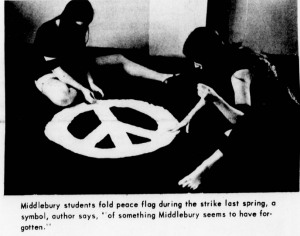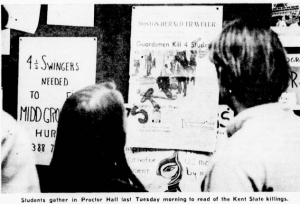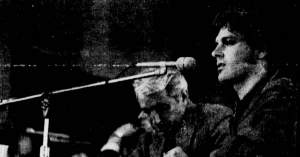“The strike was one of the great crises in the history of Middlebury College” (Dean Denis Obrien)
“At 7 a.m. on the morning of May 5, 1970, first-year Howard Burchman picked up the phone in the WRMC-FM office. His vision was blurry and his voice probably sounded tired. He had been up all night, his eyes glued to the radio station’s teletype feed, which was spitting out bits and pieces of news about the Vietnam War protest a day earlier at Kent State University in Ohio. He knew that four students had been shot by police, and like hundreds of thousands of other college students across the country on May 5, Burchman knew they could not die in vain. The voice on the other end of the line finally answered, and Burchman told Dean of the College Dennis O’Brian that he and other students wanted a suspension of classes and a memorial service
for the Kent State four. He got his wish at noon, when the College Council assembled in a special meeting and voted to suspend classes until the following Monday. But Burchman did not go back to his room and catch up on much-needed sleep. In fact, he and other Middlebury students were busier in the next few days than they had probably been all year. They pushed aside schoolwork and grumpiness over the recent snowfall and turned their attention to rallies, protests … and arson. The Strike of May 1970 had begun.” (Thomas Brant Issue date: 4/10/08)
The Middlebury College campus protests the war in Vietnam by striking on May 5th, 1970. Hundreds of students sign a petition against the deaths of the four students killed in the Kent State shootings and the invasion of Cambodia. The college suspends “normal activities” for the next six days in response to the student petition. Middlebury was part of a nation wide coordinated campus protest with 4 million students and faculty. The Kent State killings brought the war home for many american students, with more than 500 schools canceling classes.
“That’s one thing we learned about. Well, like take peace, the main thing. Most people think that all it means is peace between nations. But, you see, you can’t have peace between nations until you have peace between people, me and you. And we can’t have peace with each other until each of us has peace with himself.” — Obie Benz. The Campus October 2nd, 1970
What happened during the week?
The Strike week was “all consuming. You were either going to a rally, or a meeting in Old Chapel, or a teach in…” (Andy Wentink)
All classes were cancelled, and there were meetings, speeches, and teach-ins at Old Chapel. There was initially rallies and marches, but because of the burning of recitation hall, the town of Middlebury was terrified and not accustomed to this type of activism. The marches and demonstrations downtown stopped, and instead there was a peace vigil. Students emphasized the importance of building a healthy and peaceful relationship with the town of Middlebury.
Listen to recordings of speeches, teach-ins, and more from the strike. The students, jammed inside the chapel like sardines, stuck arounduntil 10:45 p.m., listening to speeches by professors, students and political activists. Andrew Wentink ’70, now the Curator of Special Collections and Archives, remembered the electric atmosphere of the rallies. “What was extraordinary was that the entire student body as well as the faculty came together and spoke passionately,” he said. “The initial feeling after the Kent State [deaths] was ‘What difference is a protest at Middlebury going to make?’ But I think over time there was a consensus that we should join other students and universities in protesting the war.”
They were still at it early the next morning in Proctor Hall, the organizers’ informal headquarters. Organizers set up a “strike information center” on May 6, and no one rushed past the tables on their way to make panninis. Fifty or 60 people were milling about, some wearing red rags torn into armbands, others reading posters taped to the walls with information from the WRMC teletype machine that detailed how their fellow students across America were dealing with the turmoil in the wake of the shooting. Students also paid attention to signs that called for action on campus and around town.
“We need 60 people every night for the next three days to patrol this
campus. Sign up!” one sign loudly proclaimed.
Want to read more on the strike?



